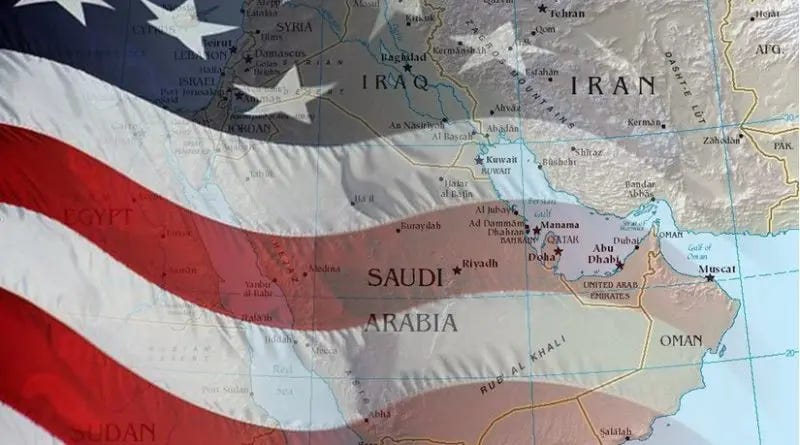America First? Then Pay Attention to the Middle East
Ignoring the Middle East does not insulate America from its problems—it amplifies them when they inevitably reach U.S. shores
In an era where "America First" dominates political discourse, the idea of focusing on issues beyond U.S. borders may seem misplaced. However, disregarding the Middle East comes at a cost—one that affects American wallets, national security, and global influence. Caring about the Middle East isn’t about charity. It’s in America’s best interest to pay close attention to the region.
While the U.S. has increased domestic energy production, the global market remains highly dependent on Middle Eastern oil. Any instability in the region can cause energy prices to spike, affecting the cost of gasoline, goods transportation, and household essentials. The global supply chain is also directly tied to critical Middle Eastern trade routes. The Suez Canal facilitates 12% of global trade, and the Strait of Hormuz, through which nearly a third of the world's seaborne oil passes, are vital chokepoints. Disruptions in these corridors can trigger economic consequences far beyond the region. If you think supply chain issues caused by a pandemic were bad, imagine a full-blown crisis in the Middle East shutting down these vital shipping lanes.
You don’t have to care about refugees to recognize the costs of mass migration. Every war, failed state, or economic collapse in the Middle East sends waves of refugees into Europe. When that happens, the political and economic effects ripple outward, including into the United States. The last major refugee crisis led to political upheavals across Europe, straining international relations and increasing pressure on the U.S. to respond. Proactively investing in stability abroad is not just a humanitarian measure—it is a strategic and cost-effective move that prevents larger crises down the road. The more cost-effective approach is to invest in stability abroad before problems reach American shores. As I often say, the Middle East is the opposite of Las Vegas—what happens in the Middle East doesn’t stay there.
America has spent trillions on wars and military operations in the Middle East. However, the reality that often goes unnoticed is that investing in economic development abroad is cheaper than deploying troops or building border defenses to manage the fallout from chaos. The cost of creating a job in the region—through trade, infrastructure, and industry investments—is a fraction of what America spends on military bases, airstrikes, and refugee resettlement programs. Helping people build businesses in their own countries keeps them from becoming refugees in the first place.
Iran is marching closer toward nuclear capability. If or when that happens, the consequences will go far beyond the Middle East. A nuclear-armed Iran means a nuclear arms race in the region, with Saudi Arabia and possibly Turkey following suit. The more nuclear weapons in unstable parts of the world, the higher the chance of conflict spilling beyond the region. And let’s be clear: an empowered Iran doesn’t just threaten the Middle East. It also strengthens anti-American forces, funds terror groups, and challenges U.S. interests worldwide. Addressing these threats through diplomatic engagement and strategic alliances is essential to maintaining global stability.
The Middle East is undergoing a significant transformation. Saudi Arabia, the UAE, and other Gulf states are investing heavily in technology, infrastructure, and tourism, positioning themselves as economic hubs. Saudi Crown Prince Mohammed bin Salman envisions the region as "the new Europe," signaling a shift from a conflict-ridden past to a future centered on innovation and business. American businesses and investors stand to gain from these developments, but disengagement could cede these opportunities to global competitors such as China and Russia.
U.S. based Christians have yet another angle to consider. Christianity is disappearing from the lands where it was born. The Christian populations in Iraq, Syria, and even parts of Palestine have been devastated by war, persecution, and economic collapse. In a few decades, the biblical heartlands may be Christian in history only. If the Middle East turns into an ungovernable battlefield between extremists and authoritarian regimes, the last remaining Christian communities will vanish. If that matters to you, ignoring the Middle East isn’t an option. For those who value religious heritage and cultural preservation, this is another reason to stay engaged.
Ignoring the Middle East does not insulate America from its problems—it amplifies them when they inevitably reach U.S. shores.
Isolationism may seem appealing, but global leadership requires engagement. This is about dollars and security, not just morality. Keeping the region stable is cheaper than dealing with the consequences of letting it burn. America has an opportunity to be part of the Middle East’s transformation. The region is shifting from a perpetual conflict zone to an emerging economic powerhouse. The U.S. can either engage with it and benefit from that change or sit back and watch as others—China, Russia—eagerly fill the vacuum. If "America First" is the priority, then strategic involvement—not retreat—is the path forward.


